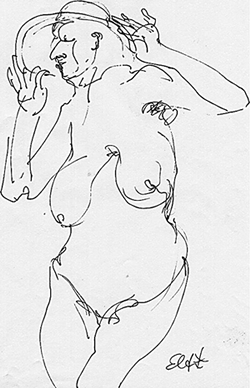The Sense of Volition: Feeling that You Choose

I have not read anywhere that, recognized to exist among organisms, there is a sense of volition. But such a sense must exist. And the notion carries a weighty philosophical import. It expresses the deterministic nature of free will. (See Nature’s Imperatives)
By a ‘sense of volition’ I mean the feeling that you are choosing; the feeling that you are exercising free will. And, like the other senses, it consists of a cloud of electrochemical activity in the body. Volition or free will, like the other senses, is determined by a combination of ones body physiology and external circumstances – i.e. by the nature of the determined world. Thus, if we view volition as one of the senses then the debate on free will vs determinism is completely resolved.
The idea that a sense consists of a cloud of body electrochemistry is a venerable one. The case was made eloquently in 1884 by William James in a piece called “What is an emotion?” (Mind, 19, 188–205).
James’ talent was the artful expression of rational thought. There are many who are rational thinkers. And many who write artfully. William James combines the two.
What he did was to reduce the issue, ‘what is emotion?’, to its philosophical essentials. He writes:
…readers (are) reminded that the nervous system of every living thing is but a bundle of predispositions to react in particular ways upon the contact of particular features of the environment.
The ever engaging author follows with evocative examples
As surely as the hermit-crab’s abdomen presupposes the existence of empty Whelk-shells somewhere to be found, so surely do the hound’s olfactories imply the existence, on the one hand, of deer’s or foxes’ feet, and on the other, the tendency to follow up their tracks.
and so
The neural machinery is but a hyphen between determinate arrangements of matter outside the body and determinate impulses to inhibition or discharge within its organs.
In short, emotion is what we experience when we are carrying out the imperatives of nature. Wrote James:
My thesis … is that … our feeling of (the bodily) … changes as they occur IS the emotion. (James capitalized IS.)
The animals in James’s examples are executing calculating strategies. Exercising volition. Like an army general preparing his tactics. They are not running at random They know the lay of the land. They are executing behavior based on assimilation of all their past experiences. The feeling accompanying this performance is a sense of volition.
When we see volitional behavior, the organism is feeling volition. There must be a physical mechanism for it. Its signature is a sense of volition.
The conjunction of material processes within the organism sensing the material processes outside it produce the organism’s behavior. How could it possibly be otherwise? What’s inside plus what’s outside the organism constitutes the entire universe.
James asserts that feelings – emotions, senses – must have some physical counterpart – either packaged or distributed. Research that discovers ‘physiological – emotional’ connections is valuable to our understanding. Research that doesn’t find such connections doesn’t disprove James’ assertion. The connections can exist but not yet have been discovered. James’ statement is not provable. Rather it is an axiom of faith governing how we think about the world.
Like the axiom that there are laws of physics. Not finding them doesn’t prove they don’t exist. We seek them on faith that they exist. Civilized humanity seek rational and ‘natural’ explanations for every phenomenon. And simply refuse – on faith – to believe supernatural ones.
Comments
One response to “Sense of Volition”
I have since learned that, among the cogniscenti, what I am here calling the sense of volition has another name; the sense of agency.